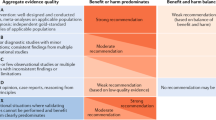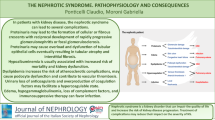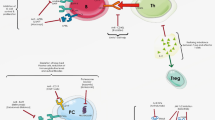Abstract
There is agreement that early diagnosis and aggressive treatment of lupus nephritis exacerbations are of paramount importance to achieve remission and prevent the development of irreversible lesions. There is less agreement about the optimal duration of maintenance treatment. Instead, the prolonged exposure to corticosteroids and/or immunosuppressive drugs can cause invalidating or even life-threatening complications. It is still unclear if these drugs can be safely withdrawn in lupus patients. We were able to completely withdraw therapy in around 1/3 of our patients after a follow-up of 5 years or more; 60 % of them never had to start therapy again. Based on our own experience, discontinuation of therapy should be applied only in selected cases, i.e. patients who received maintenance therapy for at least 5 years and are in complete renal remission for at least 3 years. Antimalarial agents are helpful in maintaining the remission after withdrawal of therapy. However, to achieve these goals, drugs should be tapered off very slowly and under strict surveillance. If all these prerequisites are satisfied, the withdrawal of therapy in patients with lupus nephritis may be considered safe, may improve the patients’ quality of life and may reduce the damage accrual.
Similar content being viewed by others
References
Bertsias GK, Tektonidou M, Amoura Z, Aringer M, Bajema I, Berden JH, Boletis J et al (2012) Joint European League Against Rheumatism and European Renal Association-European Dialysis and Transplant Association (EULAR/ERA-EDTA) recommendations for the management of adult and paediatric lupus nephritis. Ann Rheum 71:1771–1782
Ponticelli C, Glassock RJ, Moroni G (2010) Induction and maintenance therapy in proliferative lupus nephritis. J Nephrol 23:9–16
Moroni G, Raffiotta F, Trezzi B, Giglio E, Mezzina N, Del Papa N, Meroni P et al (2014) Rituximab vs mycophenolate and vs cyclophosphamide pulses for induction therapy of active lupus nephritis: a clinical observational study. Rheumatology (Oxford) 53:1570–1577
Contreras G, Pardo V, Leclercq B, Lenz O, Tozman E, O’Nan P, Roth D (2004) Sequential therapies for proliferative lupus nephritis. N Engl J Med 350:971–980
Tamirou F, D'Cruz D, Sangle S, Remy P, Vasconcelos C, Fiehn C, Ayala Guttierez Mdel M, Gilboe IM, Tektonidou M, Blockmans D, Ravelingien I, le Guern V, Depresseux G, Guillevin L, Cervera R, Houssiau FA; MAINTAIN Nephritis Trial Group (2016) Long-term follow-up of the MAINTAIN Nephritis Trial, comparing azathioprine and mycophenolate mofetil as maintenance therapy of lupus nephritis. Ann Rheum Dis 75:526–531
Dooley MA, Jayne D, Ginzler EM, Isenberg D, Olsen NJ, Wofsy D, Eitner F, ALMS Group et al (2011) Mycophenolate versus azathioprine as maintenance therapy for lupus nephritis. N Engl J Med 365:1886–1895
Moroni G, Doria A, Mosca A, Alberighi OD, Ferraccioli G, Todesco S, Manno C et al (2006) A randomized pitol trial comparing cyclosporin and azathioprine for maintenance therapy of diffuse lupus nephritis over four years. Clin J Am Soc Nephrol 5:925–932
Ioannidis JP, Boki KA, Katsorida ME, Drosos AA, Skopouli FN, Boletis JN, Moutsopoulos HM (2000) Remission, relapse, and re-remission of proliferative lupus nephritis treated with cyclophosphamide. Kidney Int 57:258–264
Houssiau FA, Vasconcelos C, D’Cruz D, Sebastiani GD, de Ramon Garrido E, Danieli MG, Abramovicz D et al (2010) The 10-year follow-up data of the Euro-Lupus Nephritis Trial comparing low-dose and high-dose intravenous cyclophosphamide. Ann Rheum Dis 69:61–64
Moroni G, Quaglini S, Gallelli B, Banfi G, Messa P, Ponticelli C (2007) The long-term outcome of 93 patients with proliferative lupus nephritis. Nephrol Dial Transplant 22:2531–2539
Renal Disease Subcommittee of the American College of Rheumatology Ad Hoc Committee on Systemic Lupus Eryhthematosus Response Criteria (2006) The American College of Rheumatology response criteria for proliferative and membranous renal disease in systemic lupus eryhematosus clinical trials. Arthritis Rheum 54:421–432
Petri M, Orbai AM, Alarcón GS, Gordon C, Merrill JT, Fortin PR, Bruce IN et al (2012) Derivation and validation of the systemic lupus international collaborating clinics classification criteria for systemic lupus erythematosus. Arthritis Rheum 64:2677–2686
Castrejón I, Tani C, Jolly M, Huang A, Mosca M (2014) Indices to assess patients with systemic lupus erythematosus in clinical trials, long-term observational studies, and clinical care. Clin Exp Rheumatol 32:S-85–S-95
Pons-Estel BA, Catoggio LJ, Cardiel MH, Soriano ER, Gentiletti S, Villa AR et al (2004) The GLADEL multinational Latin American prospective inception cohort of 1,214 patients with systemic lupus erythematosus: the GLADEL multinational Latin American prospective inception cohort of 1,214 patients with systemic lupus erythematosus: ethnic and disease heterogeneity among “Hispanics”. Medicine 83:1–17
Steiman AJ, Urowitz MB, Ibañez D, Papneja A, Gladman DD (2014) Prolonged clinical remission in patients with systemic lupus erythematosus. J Rheumatol 41:1808–1816
Zen M, Iaccarino L, Gatto M, Bettio S, Nalotto L, Ghirardello A, Punzi L, Doria A (2015) Prolonged remission in Caucasian patients with SLE: prevalence and outcomes. Ann Rheum Dis 74:2117–2122. doi:10.1136/annrheumdis-2015-207347
Moroni G, Quaglini S, Radice A, Trezzi B, Raffiotta F, Messa P, Sinico RA (2015) The value of a panel of autoantibodies for predicting the activity of lupus nephritis at time of renal biopsy. J Immunol Res 2015:106904. doi:10.1155/2015/106904
Moroni G, Trendelenburg M, Del Papa N, Quaglini S, Raschi E, Panzeri P et al (2001) Anti-C1q antibodies may help in diagnosing a renal flare in lupus nephritis. Am J Kidney Dis 37:490–498
Birmingham DJ, Bitter JE, Ndukwe EG, Dials S, Gullo TR, Conroy S, Nagaraja HN, Rovin BH, Hebert LA (2016) Relationship of circulating Anti-C3b and Anti-C1q IgG to lupus nephritis and its flare. Clin J Am Soc Nephrol. 2016(11):47–53
Fatemi A, Samadi G, Sayedbonakdar Z, Smiley A (2016) Anti-C1q antibody in patients with lupus nephritic flare: 18-month follow-up and a nested case-control study. Mod Rheumatol 26:233–239
Bock M, Heijnen I, Trendelenburg M (2015) Anti-C1q antibodies as a follow-up marker in SLE patients. PLoS ONE 10(4):e0123572
Balow JE (2005) Clinical presentation and monitoring of lupus nephritis. Lupus. 14:25–30
Chen YE, Korbet SM, Katz RS, Schwartz MM, Lewis EJ, Collaborative Study Group (2008) Value of a complete or partial remission in severe lupus nephritis. Clin J Am Soc Nephrol 3:46–53
Illei GG, Takada K, Parkin D, Austin HA, Crane M, Yarboro CH et al (2002) Renal flares are common in patients with severe proliferative lupus nephritis treated with pulse immunosuppressive therapy: long-term followup of a cohort of 145 patients participating in randomized controlled studies. Arthritis Rheum 46:995–1002
Fernandes das Neves M, Irlapati RV, Isenberg D (2015) Assessment of long-term remission in lupus nephritis patients: a retrospective analysis over 30 years. Rheumatology 54:1403–1407
Ward MM (1999) Premature morbidity from cardiovascular and cerebrovascular diseases in women with systemic lupus erythematosus. Arthritis Rheum 42:338–346
Thamer M, Hernan MA, Zhang Y, Cotter D, Petri M (2009) Prednisone, lupus activity, and permanent organ damage. J Rheumatol 36:560–564
Walsh M, Jayne D, Moist L, Tonelli M, Pannu N, Mans B (2010) Practice pattern variation in oral glucocorticoid therapy after the induction of response in proliferative lupus nephritis. Lupus 19:628–633
Condon MB, Ashby D, Pepper RJ, Cook HT, Levy JB, Griffith M, Cairns TD, Lightstone L (2013) Prospective observational single-centre cohort study to evaluate the effectiveness of treating lupus nephritis with rituximab and mycophenolate mofetil but no oral steroids. Ann Rheum Dis 72:1280–1286
Roccatello D, Sciascia S, Rossi D, Alpa M, Naretto C, Baldovino S, Menegatti E, La Grotta R, Modena V (2011) Intensive short-term treatment with rituximab, cyclophosphamide and methylprednisolone pulses induces remission in severe cases of SLE with nephritis and avoids further immunosuppressive maintenance therapy. Nephrol Dial Transplant 26:3987–3989
Pablos JL, Gutierrez-Millet V, Gomez-Reino JJ (1994) Remission of lupus nephritis with cyclophosphamide and late relapses following therapy withdrawal. Scand J Rheumatol 23:142–144
Mosca M, Neri R, Giannessi S, Pasquariello A, Puccini R, Bencivelli W, Bombardieri S (2001) Therapy with pulse methylprednisolone and short course pulse cyclophosphamide for diffuse proliferative glomerulonephritis. Lupus 10:253–257
Euler HH, Schroeder JO, Harten P, Zeuner RA, Gutschmidt HJ (1994) Treatment-free remission in severe systemic lupus erythematosus following synchronization of plasmapheresis with subsequent pulse cyclophosphamide. Arthritis Rheum 37:1784–1794
Drenkard C, Villa AR, Garcia-Padilla C, Pérez-Vázquez ME, Alarcón-Segovia D (1996) Remission of systematic lupus erythematosus. Medicine (Baltimore) 75:88–98
Ponticelli C, Moroni G, Banfi G (1988) Discontinuation of therapy in diffuse proliferative lupus nephritis. Am J Med 85:275
Moroni G, Gallelli B, Quaglini S, Banfi G, Rivolta E, Messa P, Ponticelli C (2006) Withdrawal of therapy in patients with proliferative lupus nephritis: long-term follow-up. Nephrol Dial Transplant 21:1541–1548
Moroni G, Longhi S, Giglio E, Messa P, Ponticelli C (2013) What happens after complete withdrawal of therapy in patients with lupus nephritis. Clin Exp Rheumatol 31:S75–81
Lee SJ, Silverman E, Bargman JM (2011) The role of antimalarial agents in the treatment of SLE and lupus nephritis. Nat Rev Nephrol 7:718–729
No authors listed (1991) A randomized study of the effect of withdrawing hydroxychloroquine sulfate in systemic lupus erythematosus. The Canadian Hydroxychloroquine Study Group. N Engl J Med 324;150–154
Aptekar RG, Decker JL, Steinberg AD (1972) Exacerbation of SLE nephritis after cyclophosphamide withdrawal. N Engl J Med 286:1159–1160
Sharon E, Kaplan D, Diamond HS (1973) Exacerbation of systemic lupus erythematosus after withdrawal of azathioprine therapy. N Engl J Med 288:122–124
Author information
Authors and Affiliations
Corresponding author
Ethics declarations
Conflict of interest
The authors declare that they have no conflict of interest.
Ethical approval
All procedures performed in this study were in accordance with the ethical standards of the institutional research committees and with the 1964 Helsinki declaration and its later amendments or comparable ethical standards.
Statement of human rights
For this type of study, formal consent is not required.
Informed consent
Informed consent was obtained from all individual participants included in the study.
Rights and permissions
About this article
Cite this article
Moroni, G., Raffiotta, F. & Ponticelli, C. Remission and withdrawal of therapy in lupus nephritis. J Nephrol 29, 559–565 (2016). https://doi.org/10.1007/s40620-016-0313-6
Received:
Accepted:
Published:
Issue Date:
DOI: https://doi.org/10.1007/s40620-016-0313-6




